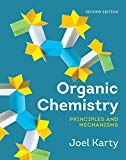
(a)
Interpretation:
The mechanism and the product(s) for the given reaction are to be drawn.
Concept introduction:
An
(b)
Interpretation:
The mechanism and the product(s) for the given reaction are to be drawn.
Concept introduction:
An epoxide can be produced from an alkene using a peroxyacid
Trending nowThis is a popular solution!

Chapter 12 Solutions
Organic Chemistry: Principles and Mechanisms (Second Edition)
- Draw the complete mechanism of each pair of reactants including any favorable rearrangements and all important resonance structures of all intermediates. a. Which reaction has a lower PE carbocation intermediate? b. Draw an energy diagram showing the reaction profiles of both reactions in the previous question. Use a dotted line for the first pair of reactants and a solid line for the second pair of reactants. (Assume the energy of the starting materials and products are the same for both pairs and the reactions are neither uphill nor downhill on net. c. Mark points on the energy diagram corresponding to each carbocation in your mechanisms.arrow_forwardSometimes carbocation rearrangements can change the size of a ring.Draw a stepwise, detailed mechanism for the attached reaction.arrow_forwardFor the following reaction, draw a complete reaction mechanism using curvy arrows being sure to show all important intermediates and the final product.arrow_forward
- a) Draw the reaction mechanism of each step, taking into account the stereochemistry. b) Name the product(s) obtained, at the endarrow_forwardDraw the structure of product, substrate, or condition in the following reactions (should clearly show the stereochemistry).arrow_forwardDraw the full electron pushing mechanism for the reaction depicted including ALL intermediates (with lone pairs and formal charges). Clearly label the electrophile and nucleophile in each step where appropriate.arrow_forward
- please help with this question thank you. Draw the mechanism for the reaction given.arrow_forwardDraw the detailed mechanism and the product for the following reaction. Be sure to include stereochemistry, if applicable. Brarrow_forwardDraw all of the products and the mechanism for the reactionsarrow_forward
 Organic Chemistry: A Guided InquiryChemistryISBN:9780618974122Author:Andrei StraumanisPublisher:Cengage Learning
Organic Chemistry: A Guided InquiryChemistryISBN:9780618974122Author:Andrei StraumanisPublisher:Cengage Learning
